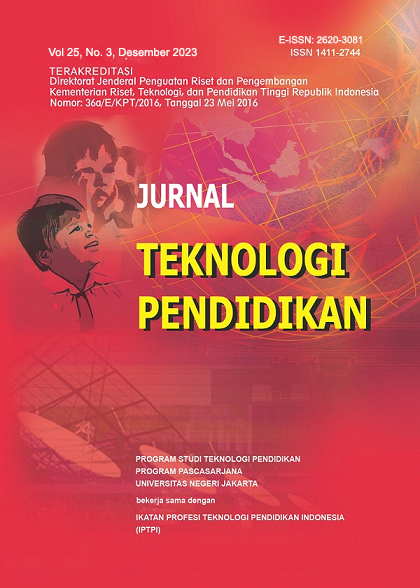Study of The Concept of Vocational Guidance and Counseling in Vocational Schools
DOI:
https://doi.org/10.21009/jtp.v26i1.45471Keywords:
guidance and counseling, vocational, teacherAbstract
The concept of vocational guidance and counseling in vocational high schools (SMK) plays a crucial role in shaping the future of students. A recent study conducted at SMKS Teknologi YPL Lirik aimed to explore the general overview of guidance and counseling implementation, the steps taken by school principals and teachers, and the challenges faced in this aspect. Using a qualitative descriptive approach, the researchers directly collected data through interviews, documentation, and involving key stakeholders such as the school principal, vice principal of student affairs, subject teachers, class advisors, guidance counselors, and students. The gathered data was then analyzed through a process of reduction and interpreted qualitatively to draw conclusions. According to the interviews conducted with school officials, it was revealed that the current guidance and counseling practices at SMKS Teknologi YPL Lirik are inadequate. This is evident from the students' behavior, which tends to be naughty or undisciplined due to family or community environmental factors. To achieve holistic character education through guidance and counseling, the school must establish good cooperation with parents, maintain direct communication with them in case of any issues at school, and find solutions collaboratively to foster positive character growth in both the family and school environments. In conclusion, the study emphasizes the importance of enhancing guidance and counseling practices in vocational high schools to better support students in their personal and academic development. By addressing challenges and strengthening collaboration between school stakeholders, SMKS Teknologi YPL Lirik can create a more conducive environment for students to thrive and succeed in their vocational endeavors.
References
Ad, Yahya, and Winarsih Winarsih. "Personal-Social Guidance Services in Improving Interpersonal Communication for Class XI Students of SMA Negeri 2 Padang Cermin, Pesawaran Regency." ejournal.radenintan.ac.id/index.php/konseli/article/view/554
Agustina, Y. (2018). Vocational Guidance and Counseling in Improving Student Competence. Journal of Sports and Health Coaching Education, 2(2), 47-53.
Ahmad. (2016). Meaningful learning. Indonesian University of Education (UPI). Bandung.
Amidah. (2013). Teacher Strategies in Increasing Students' Interest in Learning in Islamic Religious Education Subjects in Public Elementary Schools 147 Palembang.OnlineJurnal.http://jurnal.radenfatah.ac.id/index.php/concienc ia/article/view/98/84. Accessed 17 October 2021.
Anwar, M. (2018). Vocational guidance and counseling: Concepts and applications. Bandung: PT Teen Rosdakarya.
Arianti. (2017). The Urgency of a Conducive Learning Environment in Encouraging Students to Actively Learn. Journal of Education, Vol. 11, no. 1, June 2017, ISSN 1978-0214, pp. 41-62.
Arumsari, F., & Sugiyanto, FX (2019). Guidance and counseling in vocational high schools. Jakarta: Rajawali Press.
Astuti, FD (2013). The influence of students' initial abilities and effectiveness on the results of final assignment projects in control system operation and assembly subjects at SMKN 2 Yogyakarta. Thesis. Yogyakarta: Yogyakarta State University.
Ausubel, D. P. (2012). The use of advanced organizersmin the learning and retention of meaningful verbal material. Journal of Educational Psychology, 51, 267-277
Ayriza, Yulia. 2009. "Development of a Personal Social Guidance Module for Guidance and Counseling Teachers to Face Natural Disasters. journal.uny.ac.id/index.php/jk/article/view/210
Aziz, Jamil Abdul. (2019). Teacher Interpersonal Communication and student learning interests. Journal of Islamic Education, vol 2 No 02 pp 149-165.
Bahri, S & Zain, A. (1995). Teaching and learning strategies. Jakarta; Rinekan Cipta.
Creswell, John W. 2017. Qualitative, Quantitative and Mixed Methods Approaches. Yogya: Student Library.
Creswell, J. W. (2014). Research Design: Qualitative, Quantitative, and Mixed Methods Approaches. Thousand Oaks, CA: Sage Publishers.
De Cecco, J.P. (1968). The psychology of learning and instruction: educational psychology. New Jersey: Princeton University Press.
Ministry of National Education. (2003). National education system law number 20 of 2003.
Ministry of National Education. (2008). Curriculum at Education Unit Level: Vocational High Schools published by the Ministry of National Education in Jakarta.
Directorate of Middle School Development. 2010. Character Education Guide. Ministry of National Education: Jakarta.
Fuad & Zuraini. (2016). Factors that influence class I students' interest in learning at SDN 7 Kute Panang. Tunas Bangsa Journal, pp. 42-54.
Hanum, Atifah, and Casmini Casmini. 2015. "Personal-social guidance for student self-efficacy and its implications for guidance counseling at Diponegoro Vocational School, Depok, Sleman, YOGYAKARTA." Hisbah Journal, vol. 12, no. 2, Dec.ejournal.uin-suka.ac.id/dakwah/hisbah/article/view/1104
Irawati, RK (2014). The influence of problem posing and problem solving models and initial abilities on student learning outcomes, Journal of Science Education, 2(4). 184-192
Khalilah Emi. 2017. Personal Social Guidance and Counseling Services in Improving Students' Social Relations.www.neliti.com/id/publications/270095/
Miles, M.B., Huberman, A.M., and Saldana, J. (2014). Qualitative Data Analysis Book: Reference Source for Methods. Publication of Sage Publications, Thousand Oaks, CA.
Mochtar Buchori, 2007. Character building and our education. (http://www.kompas.co.id/kompas-print/0607/26/opini/2836169.htm). (Downloaded 18 September 2018)
Moleong, Lexy J. 2011. Qualitative Research Methodology. Bandung: Rosdakarya Youth.
Sugiyono. 2018. Quantitative, Qualitative and R&D Research Methods, Alfabeta publisher, Bandung.
Suryani, E. (2015). Vocation and entrepreneurship Counseling Guidance. Bandung: PT Teen Rosdakarya.
Downloads
Published
How to Cite
Issue
Section
License
Jurnal Teknologi Pendidikan is an Open Access Journal. The authors who publish the manuscript in Jurnal Teknologi Pendidikan agree to the following terms.
Attribution-ShareAlike 4.0 International (CC BY-SA 4.0)
-
Attribution — You must give appropriate credit, provide a link to the license, and indicate if changes were made. You may do so in any reasonable manner, but not in any way that suggests the licensor endorses you or your use.
-
ShareAlike — If you remix, transform, or build upon the material, you must distribute your contributions under the same license as the original.
- No additional restrictions — You may not apply legal terms or technological measures that legally restrict others from doing anything the license permits.
Notices:
- You do not have to comply with the license for elements of the material in the public domain or where your use is permitted by an applicable exception or limitation.
- No warranties are given. The license may not give you all of the permissions necessary for your intended use. For example, other rights such as publicity, privacy, or moral rights may limit how you use the material.








